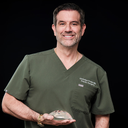Your question is a very good question, but I'm afraid at this point it is fraught with a number of uncertainties and inaccuracies. There are so many issues brought up by this that I think the only way you are going to get any useful information at all will be if you seek a consultation with a board certified plastic surgeon who is experienced in breast surgery, and especially in the use of ADM's (Acellular Dermal Matrices, like Alloderm). You also need to be sure that you receiving solid clinical and scientific information based upon the actual known evidence at this time, because unfortunately, there are a number of board certified plastic surgeons who, for whatever reason, do not adhere to this commitment to ethics and evidence-based practice. Women are undergoing unnecessary surgery or being caused great anxiety on a daily basis because of the misinformation that is so prevalent out there. The truth of the matter is that most of us are not trying to cover anything up or "protect our industry" as much as just fight for the honest truth based upon science and then use that to guide our practice responsibly instead of shooting from the hip and creating a lot of hysteria.Having said that, I would like to first state that no responsible surgeon should doubt or dispute your symptoms or complaints, especially if you have observable physical symptoms or laboratory abnormalities indicating that something is wrong. The big question, though, is what is the CAUSE of this? You report that you had Alloderm placed in 2016, three years ago, and that you have been told that the Alloderm is the "cause" of your condition. My question is" "What is this conclusion based on?" First of all, most ADM's, unless they fail to incorporate, will become incorporated into the tissues within about 24 months; that is, they become a part of you and your tissues. That is how they are designed to work. Alloderm is a human derived tissue component, so there is no foreign substance to cause a reaction to, unless there was some kind of contamination. It is conceivable that a portion of Alloderm may have failed to incorporate, or "grow into," the surrounding tissues, and this in turn could conceivably develop a biofilm which could conceivably lead to symptoms of chronic inflammation, but this is all very highly speculative, and again, I return to my question: "What is this conclusion based on?" The simple answer to your question is, yes, Alloderm can be removed in a pretty straightforward manner, but this Alloderm may not be the source of your problem, and removing it then may not solve the problem, in which case you will have undergone an unnecessary procedure and be no closer to a true solution because you were chasing red herrings. On the other hand, if the Alloderm was in some way contributing to your problem removing it could be curative. This is why you really need a solid, in-depth consultation to evaluate all of your options and their alternatives. We are living in interesting times right now with regard to the whole issue of "implantable materials" for the breast, and we are learing new information every day. This does not mean, however, that we should just jump to conclusions and make diagnoses and recommend surgery without some kind of strong scientific basis other than our "gut feelings" and the fact that we can't seem to find any other explanations or plans.To answer your question about your appearance after removal of Alloderm, it will be hard to say without examining you and getting all of your details, but Alloderm, and the capsule around an implant, really should not comprise a lot of the volume of the breast, and depending upon what is decided upon after removal of the capsule - replacement of implants, fat transfer for volume, or other options - you may be able to achieve an appearance very similar to the one you have now. Again, this is a question that really needs to be addessed in detail during a careful, comprehensive evaluation of your case.So, to summarize, I urge you resist the temptation to just jump on the first recommendation that sounds plausible without fully evaluating all of the medical considerations. I know you are struggling with physical ailments, and that is unfortunate, but the one thing that is true is that unless you find out what is actually causing those symptoms and address that specific issue, those symptoms may not, likely won't, get better. In the end, it may be that surgical removal of your Alloderm, with our without your implants, is the best solution for you. Just be sure that you have first done your due diligence and come to that conclusion with the expert opinions of people who work with ADMs like Alloderm and with breast implants as part of their routine practice and who are up to date on the latest scientific evidence available on the subject. Best of luck to you!







